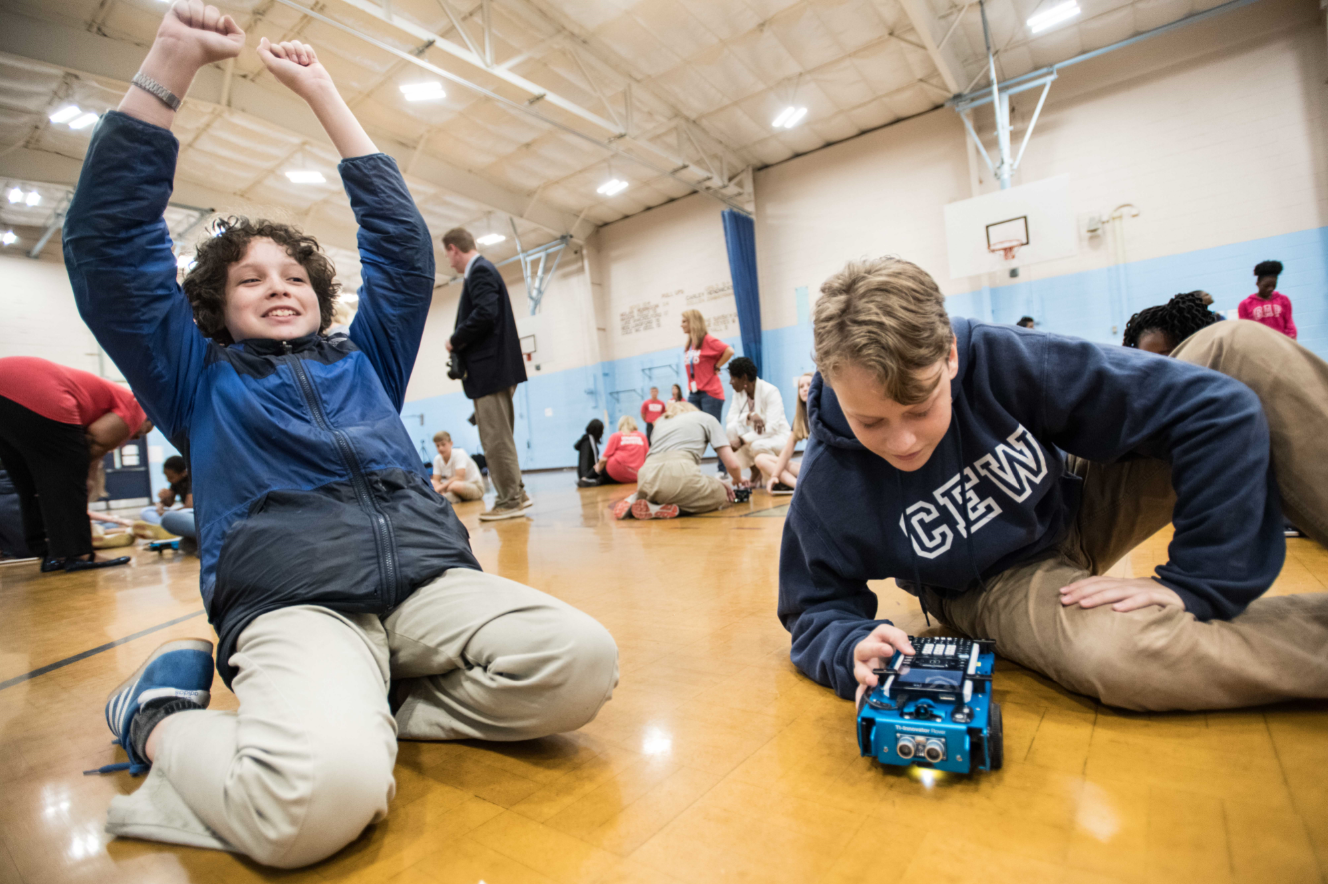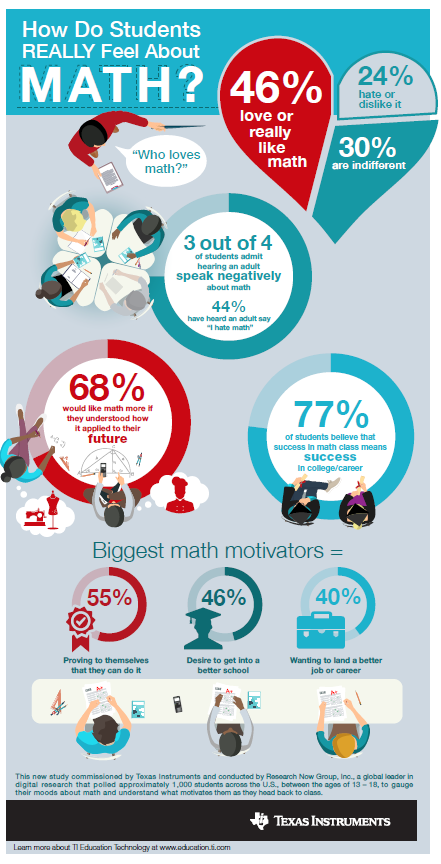Survey Says: Kids Like Math!
How many times have you heard someone say they’re not a “math person?” Probably more than you can count. Most of the time, it’s an adult saying this. It’s likely because their math education relied heavily on memorization to learn facts and procedures.
Fortunately, that’s no longer true. Teaching techniques have evolved, and more and more kids today are learning something much more valuable and useful: algebraic thinking, number sense, and how to use multiple representations and reasoning to solve real-world problems.
Many kids today are not just “math people,” they are math lovers. They understand how math shapes their world, and they crave math knowledge they can relate to. A new TI Education Technology survey of 1,000 students found that 46 percent of kids say they love or really like math, nearly twice as many than those that said they don’t like it.
Think about that for a moment. Nearly half of all kids have positive feelings about math! That’s an encouraging statistic and one we as educators, parents and a society should embrace. Still, we need to temper this wonderful stat with some of the challenges we still face. The same survey found that 24 percent of kids hate or dislike math and another 30 percent were indifferent to math.
I don’t dwell on the negative, instead focusing on what we can do to grow math love. As a parent, longtime educator and the head of TI’s Education Technology business, I’m optimistic that we can expand the number of math lovers by building on what many educators are already doing – meeting kids where they are with learning tools and techniques that help kids make sense of the world around them.
Teachers, school administrators and parents all share a responsibility in making math real and relatable for children. In the classroom, educators are using creative ways to engage students with math programs through the things they are naturally interested in, whether that’s art or football or video games. At the district level, administrators are making math the foundation for a myriad of educational and career opportunities in STEM fields.
At home, it is important for parents to be patient during homework and to keep everyday conversations about math positive. After all, our survey showed that 75 percent of kids have heard adults speak negatively about math, and 44 percent have heard an adult say, “I hate math.” That needs to change. Personally, I have enjoyed exposing my kids to fun things that require math like programming and after-school robotics clubs. These activities allow kids to have a great time collaborating with others, while seeing the practical application of math.

Students having fun seeing the practical application of math through robotics, with the TI-Innovator™ Rover.
Our survey showed that 68 percent of children said they would like math more if they better understood how math applied to their future. One way we hope to help kids do that is through "STEM Behind Cool Careers,” a series of calculator activities that show kids how they will have to use math in any career, even ones they would least expect, from commercial airline pilot to fashion designer.
I’ve witnessed the power of these efforts first hand. When a child can finally relate to a concept they’ve have been struggling with, their eyes light up as the math comes to life for them. You can literally see it. They’re happier and more fulfilled. And, the best part, they’re hungry for more.
The days of math tables and rote memorization are long over. These old techniques are perhaps the fastest way to turn a child who is a math lover into a math hater. The current and future generations of kids already understand that we all need to be “math people” with the ability to think critically and solve problems. (77 percent of students we surveyed said they realize that math success equals success in college or career). That means making math real, fun, relatable, and engaging.
Like any field of knowledge, math starts easy and gets more challenging. Advanced math is tough for anyone. But it’s so rewarding. If we can instill a passion for math at a young age, and continue to fuel that passion, it becomes that much easier for children to grow and leverage their love and knowledge of math and to find creative solutions to some of the world’s greatest challenges, from healthcare to the environment.
About The Author: Peter Balyta, Ph.D., is vice president of academic engagement and corporate citizenship for Texas Instruments, and president of its Education Technology business. He is responsible for leading teams that focus on the mission of teaching, learning and being inspired by STEM subjects and the impact TI makes in the communities in which it operates. He is a former mathematics educator, math and science district supervisor and a TI Teachers Teaching™ (T3™) instructor. Follow him on Twitter @pbaylta.
Tagcloud
Archive
- 2026
- 2025
- 2024
- 2023
- 2022
-
2021
- January (1)
- February (3)
- March (5)
-
April (7)
- Top Tips for Tackling the SAT® with the TI-84 Plus CE
- Monday Night Calculus With Steve Kokoska and Tom Dick
- Which TI Calculator for the SAT® and Why?
- Top Tips From a Math Teacher for Taking the Online AP® Exam
- Celebrate National Robotics Week With Supervised Teardowns
- How To Use the TI-84 Plus Family of Graphing Calculators To Succeed on the ACT®
- AP® Statistics: 6 Math Functions You Must Know for the TI-84 Plus
- May (1)
- June (3)
- July (2)
- August (5)
- September (2)
-
October (4)
- Transformation Graphing — the Families of Functions Modular Video Series to the Rescue!
- Top 3 Halloween-Themed Classroom Activities
- In Honor of National Chemistry Week, 5 “Organic” Ways to Incorporate TI Technology Into Chemistry Class
- 5 Spook-tacular Ways to Bring the Halloween “Spirits” Into Your Classroom
- November (4)
- December (1)
-
2020
- January (2)
- February (1)
- March (3)
- April (1)
- May (2)
- July (1)
- August (2)
- September (3)
-
October (7)
- Tips for Teachers in the time of COVID-19
- Top 10 Features of TI-84 Plus for Taking the ACT®
- TI Codes Contest Winners Revealed
- Best of Chemistry Activities for the Fall Semester
- Best of Biology Activities for the Fall Semester
- Best of Physics Activities for the Fall Semester
- Best of Middle Grades Science Activities
- November (1)
- December (2)
- 2019
-
2018
- January (1)
- February (5)
- March (4)
- April (5)
- May (4)
- June (4)
- July (4)
- August (4)
- September (5)
- October (8)
-
November (8)
- Testing Tips: Using Calculators on Class Assessments
- Girls in STEM: A Personal Perspective
- 5 Teachers You Should Be Following on Instagram Right Now
- Meet TI Teacher of the Month: Katie England
- End-of-Marking Period Feedback Is a Two-Way Street
- #NCTMregionals Kansas City 2018 Recap
- Slope: It Shouldn’t Just Be a Formula
- Hit a high note exploring the math behind music
- December (5)
- 2017
- 2016
- 2015

